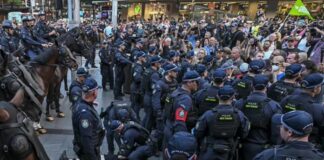A new movement is blooming in France out of the Place de la Republique square in Paris.
It has been occupied by nightly general assemblies since a demonstration against the Labour-type government’s attack on workers’ rights last month.
Student activist Gael Braibant said, “Depending on the weather there’s usually a few thousand people there every night. We discuss everything—not just the functioning of the occupation but debates about the system, the police and the role of violence. And we elected a committee that plans actions.”
In early April more than 100,000 people marched in Paris as part of a day of action called by unions against the proposed Work Law.
That evening up to 2000 people from the occupation marched to link up with refugees and migrants camping out on the streets of Paris.
Cops recently cleared them out of the area under the elevated Metro line at Stalingrad station and put up fences to stop them returning. So occupiers and migrants together went there and took the barriers down.
More than a million people have protested or struck against the Work Law. But there is a question about the movement’s leadership. Main student union Unef held talks with Valls. Those unions opposing the Work Law have called a second day of strikes and protests on 28 April, too slow for many activists.
The occupation represents an alternative vision of the struggle—and its objectives. Gael said, “This absolutely isn’t a movement that’s against political parties or unions. But it has come about largely outside the existing organisations. Many of the workers here are from sectors with no union organisation.
“One supermarket checkout worker brought people from the occupation to go down to her workplace to convince her colleagues to join a union.”
The economist Frederic Lordon, one of the figureheads of the movement, has argued that the only way to win is through a general strike.
Denis Godard, a member of the occupation’s action committee, wrote in the New Anti-capitalist Party’s newspaper, “The occupations give the movement a direction, a questioning of the whole logic of the system, a possibility of bringing together the different fronts of struggle.
“This cannot last and develop without linking the movement of the squares to the struggle in every workplace, every university and college, every neighbourhood—and by scoring victories starting with the withdrawal of the Work Law.”
By Dave Sewell
Socialist Worker UK





